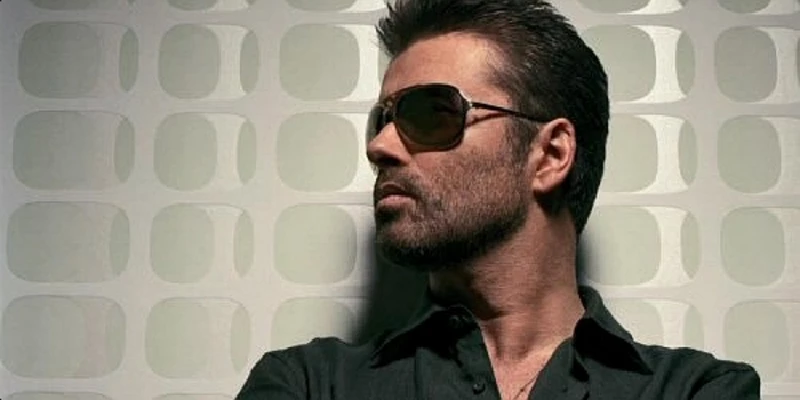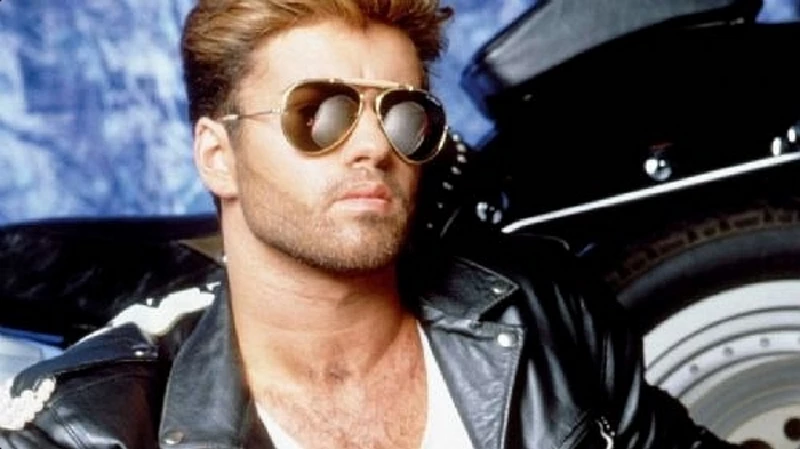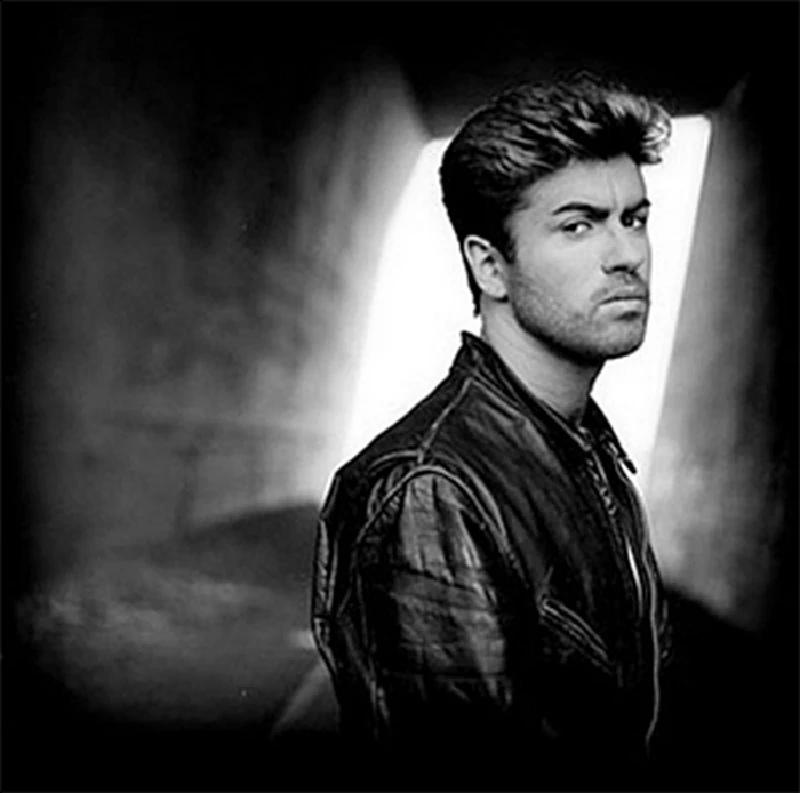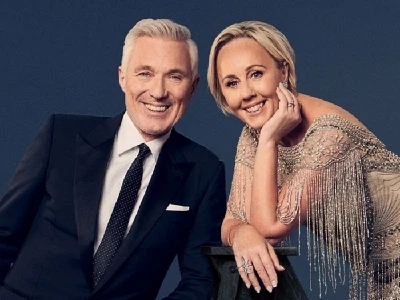George Michael - Interview
by Nick Dent-Robinson
published: 18 / 4 / 2015

intro
In this interview, which was originally published in 1990, George Michael talks to Nick Dent-Robinson about his then new album ‘Listen Without Prejudice’ and his search for success
From chubby schoolboy to comic rapper to disco heart throb through sex-crazed rocker, George Michael has decided his new persona will be that of serious, concerned, songwriter. In a remarkably frank interview he explains all to Nick Dent-Robinson. George Michael, born Georgio Kyriacos Panayiotou, was a short, fat, frizzy-haired, scruffy schoolboy who teamed up with Andrew Ridgeley, an attractive, street-smart lad, to form a band called Wham! Their success was instant. Or so the publicity machine would have us believe. In fact, music industry sources suggest there were actually a number of lost months along the way, but we won’t go into that here, and we will also allow George Michael to retain his “official” age of 27 - though some in the music industry have cast doubt on that, too. It is certainly true that stardom came so soon it deprived George Michael of a normal conclusion to his childhood and teen years. Happily, in the mid-eighties he claims to have discovered “real sex”. He broke with Ridgeley and changed his image from disco-bouffant to “high-cred” leather. Now he still gets a lot of sex, he says, but feels he is not yet ready to share his life with anyone. And he assures me he is about to withdraw from publicity and promotion, the better to concentrate on song writing. An autobiography is being published, he has appeared with Melvin Bragg on ‘The South Bank Show’ and a new album, ‘Listen Without Prejudice’, is out. His star sign is cancer. “Perhaps it is a bit late for mystique,” George Michael muses. George Michael’s publicist had met me in a café in Maida Vale, North West London. She was strikingly beautiful. We drank coffee while, nearby, a gaggle of mournful-looking teenage girls waited outside a block of flats hoping to catch sight of the members of Bros who live inside. Also outside was a large, black BMW - the best money can buy - with a chauffeur who whisked us away to the home where George Michael lives alone with his hair, in all its ever-changing moods. The house is buried deep in a private estate. It is protected by cameras, electric gates, five full-time security guards and three Dobermans. The publicist and I both take our shoes off in deference to the pristine carpet, which laps luxuriously against the rather orange-hued woodwork. The man of the house has been walking Hippy, his dog. At the risk of insulting Hippy’s owner, the dog looked to be a rather murky-coloured, mid-sized mongrel, but he is clearly loved by his owner and dog-walking is one of the pastimes George Michael lists for fan magazines, along with going to the supermarket and playing squash. George Michael has just flown back from Los Angeles. He flew Virgin. He is deeply tanned and is wearing blue shorts, a yellow T-shirt and a Los Angeles Lakers cap. We talk, seated on two cream leather sofas, separated by a glass coffee table in a black frame base. Outside there is the shade of his bosky garden. His stereo is a Sony. He drinks Evian. He munches a Planters’ salted cashew nut. There are people who need to know this stuff. “In pursuing stardom,” George Michael begins, “I have wasted a lot of time. Until I took it as far as I could, I never realised how meaningless chasing the celebrity circuit really was. In the eighties you didn’t have to do much more than keep repeating what you had already done and, as long as your youth held up and you didn’t let anybody down age-wise, you didn’t have to worry about much more than that. It’s really easy once you know how.” “Easy” is the point. George Michael was born into a stable, worthy, Greek business family. He was, by his own account, an unprepossessing child. At puberty the only thing that did not go wrong with him physically was spots. At the age of eight, he realised he wanted to be a pop star and, in his teens, he realised this meant doing something about his appearance. “Back then I just wanted the attention of thousands of women, I suppose. I was a very insecure child. Most huge stars are driven by such insecurity. I wasn’t that attractive and I just had this feeling that if I could become a pop star I could make up for my shortcomings. What happened was that, at some point, I realised that I could do much more than that. You could take yourself to a level where you are almost untouchable, which, to be really honest with you, is where I reckon I am now.” George Michael wanted to be like the confident, good-looking Ridgeley, who he had met when he was 11. This involved straightening his hair and, at 15, having the hairs that joined his eyebrows plucked out regularly by his sisters, Melanie and Yioda. The first band failed and then Wham! was formed. It succeeded almost immediately with three rap singles. They did not have a clue what they were doing. The songs were intended to be parodies but, oddly, they somehow engineered a rap revival. Meanwhile, George Michael was acting as manager and desperately trying to imagine what kind of music he should be trying to write. From post-school life onwards he was the organisational one. He also tried desperately to be creative too. Ridgeley brought style, presentation and the general air of making lots of money, dancing, having sex a lot and living the brain-dead good life. They lurched into the usual music business litigation and out of it and back into it again, emerging determined to be the biggest straight pop stars in the world. “We went out and out pop. We thought it was the most honest thing you could do. Also the best way to make a fortune. We didn’t want to be subversive in any sense. We wanted to be huge stars. I knew that I could do it. I knew that I had the potential, craft-wise, to put us ahead of Culture Club and the rather artificial Duran Duran. So I just went for it.” This quote says much about the climate of the time. Punk had gone and the pop pendulum had swung. It was time for disco-bubblegum once more- the kind that prepubescent girls and their parents can like. In fact, this is the natural condition of pop since it produces maximum sales which, by definition, is what pop has to be all about. There were no fewer than six different million-selling singles in 1984. Today, you can reach No 1 by selling as few records as 15,000 in August and 40,000 normally. The demands of the extreme pop end of the cycle are for unthreatening, rather feminine-looking male stars. George Michael got this in one. “I was deliberately appealing to young girls in a non-sexual way. It was deliberately a slightly feminine image in the sense that is what young girls want at a certain age...nothing that looks vaguely hairy or threatening. A lot of the pop groups try hard to be like that. For example, Duran Duran. And some didn’t even have to try hard - like Boy George.” George Michael’s image for that age is still aped by every chancer that sits outside Stringfellows’ on a Saturday night in an Astra GTE or an Escort Cabriolet. Most typically, it involves a white suit with no shirt, sunglasses and bouffant waves of highlighted hair. It was, above all, detached, George Michael explains. There was no sub-culture involved, no subversion, no pretence at art, no intellect or intelligence and no blown minds. You danced the night away and went to work the next day. George Michael played this culture like a maestro, convincing himself he must be good-looking if so many screaming virgins thought so, and he worked at developing an immaculate technique for putting across the soulful, girlie look on camera. He admits to being a calculating and a smart businessman, but he thinks it is only the old fools from the sixties and early seventies who find such an attribute difficult. “You see, the rock ‘n’ roll industry still lives with this romantic notion that if you are a mess in everything other than your music, then your music is more beautiful and raw. If you are not aware of the business trappings, then it makes the centre much more real. That is balls. I am just too together for people. They say I am not very interesting. But I don’t give a toss about that. They just want some real contradictions. I am sorry that I am not Keith Richards or Keith Moon, or that I am not born of the sixties. But I am an eighties pop star. It is not the same business now. It is not the same world. You can do all these things and be successful and manipulate all the other areas...and make a bloody fortune!” George Michael is habitually said to be a Thatcherite rocker. This irritates him mildly, although he happily admits to being a keen capitalist who could never vote for Neil Kinnock. “Human nature is capitalist, isn’t it?” But it would be more accurate to call George Michael’s music industrial rock. It is researched, planned and tuned to a particular audience and produced by an industry that, over 30 years, has seen it all. Meanwhile, as Ridgeley was having the time of his life, George Michael began to get depressed in the aseptic straightjacket of Wham! Sex started to creep into the songs. “The sheer cleanliness of it all started to make me feel uncomfortable. Wham! was a concept we had when we were quite young and when we didn’t know anything about anything. Andrew was still completely into the lifestyle, but I was growing up. The whole thing was that I had never been in a real relationship with anyone and then I began to get the whole feeling of being a real adult in the sexual sense. It just started to come out in the last couple of Wham! singles. The first verse of the last one, ‘Edge of Heaven’, was really filthy. But I knew nobody would hear it because it was Wham! And nobody did.” After the split with Ridgeley, George Michael says he spent nearly a year drinking, taking some “silly drugs” and having a good deal of “real sex” with Cathy Young, his girlfriend. Work on his ‘Faith’ album brought him back to reality; the hair was cropped, the jacket leather, the toe-caps steel, the chin stubbled - designer style - and the video, featuring fetishistic close-ups of Cathy, was banned. Which boosted sales. The single was helpfully entitled ‘I Want Your Sex’, for anybody who might otherwise have missed the rather unsubtle point. “It was much more me than Wham! …sporting the hair and the beard, I just added the guitar. But the stance wasn’t me really, not all that arrogance.” “No?” I asked. “No, not at all! That’s the final piece of clothing I never really had, all that aggression, that ‘don’t mess with me’ look. The steel toe-caps were mine. I looked rather like a caricature of myself.” Anyway, it worked. George Michael found a huge new audience. “Now starting to feel like an adult, it wasn’t such a great kick to be adored by millions of virgins, you see,” George explains. The album sent George Michael high into the thin air of the music business breathed only by the likes of Madonna, Prince and Michael Jackson. George Michael “conquered” America, building on the beachhead which was all Wham! had ever established there. Somehow, he became categorised as white R&B and he attained higher credibility. He was thought to be a class act and the money, said by some to be $50 million a year - though George Michael declines to confirm this - rolled in. With just a little prompting from his publicist, George Michael does mention that a fifth of the income from ‘Faith ‘went to charity. He adds that he has grown sceptical of the big pop charity events, though. “They are not only distasteful, they are positively destructive, in my view,” he opines. Such dissidence aside, again George Michael seemed to have flawlessly calculated his next step on the high wire of fashion. “There has never been any time, except for very early on, when I have lost control,” he says. And it would seem he is right. There certainly appear to be no Svengalis in his biography, at least none that he is telling about, and no scum-of-the-earth industry man telling him what to do. Indeed, he says he felt a shock when he first realised that he had a better idea of how to handle the stardom of Wham! than any record company executive did. It is worth perhaps just saying here, however, that nobody in the massive PR department of his record company remembers it quite like that. Nevertheless, regardless of why he changed into the ‘Faith’ persona, the effect was a brilliant marketing coup that lifted him effortlessly from stardom to superstardom. Incredible as it may seem for those brought up in the high productivity days of pop in the sixties and seventies, it took only one album to do this. Video and globalisation have stretched the promotional period for a major record now to almost two years and George Michael’s ten year career includes only four albums. In ‘Listen Without Prejudice’ he gets serious. This is quite a heavy number. Monochrome covers, subdued, almost ascetic arrangements and some solemn lyrics, though nothing very subtle. There is no video and less promotion than normal. The new book, meanwhile, is intended - or so George Michael says - to “draw the line” under all the self-exposure. “It is like a definitive document of what the ten famous years of my life were really about. I don’t want to do as much promotion in the future. I need a break from all that. You know, I am such an open, honest guy that when I talk to people I give away a lot about myself. And yet they sometimes seem to think that I’m rather immodest and boastful. I never understand that.” “Really?” I asked. “Yes, I just don’t get it,” George Michael says. “Anyway, I don’t think I should do too much more of this high profile publicity stuff. I have grown up so much in the past couple of years and the person I have now become...I don’t really see why I should expose to anybody. I am tired of the dichotomy between myself and my music. I have done myself no favours by being so level-headed about everything.” So, another album, and another meticulously explained change of direction. First there was the comic rapper, then the disco heart throb, then the sex-crazed rocker and this time we’re getting the serious, sober-sided, concerned songwriter. Suspiciously neat, perhaps? Well, perhaps there is slightly more to it than that. As many in the music business say, George Michael’s musical talent is rather unoriginal. But there is something a little unusual about the sheer seamlessness of his justifications. Perhaps George Michael’s true art is not music after all. Perhaps it is the construction of pop personae. When George Michael talks of the rap phase, the pop phase and so on, he links them with extraordinary perfection to autobiography, cultural history and market pressures. There really is no chink of light here; it all seems to make perfect sense. But is it just the skill he has of interpreting past events with the benefit of hindsight in order to make some currently important point? Maybe George Michael should have been an Oxford history or sociology don? Or is it simply that he is so driven by his ego that he has spent almost every living moment of the last ten years analysing, repackaging, re-presenting what has been happening to him? Of course, it is obvious really. At all of 27 (that official age, again) and after such phenomenal success, George Michael would be developing immortal longings for his art, wouldn’t he? It is just another step in the old process of being adored...wishing to be adored for ever. Appearances on ‘The South Bank Show’ are perhaps just the latest version of plucking his eyebrows. Perhaps it is this ability, if you like, this gift, that has been keeping George Michael ahead of the pop pack. Many now believe he has outlived Duran Duran, Boy George and many of the other one-hit bands who fought for record sales in those balmy days of the mid-eighties. Now he is planning to outlive Michael Jackson and Madonna. The odds are far higher, but the basic technique will be the same - be cool, be nice, be smart, be together, be professional. I put it to George Michael that there is another man who has made an art out of the strange personality shifts and the unreality of the pop star’s life, and that is Bob Dylan. But mention of this name severely irritates George Michael. “Well, I simply cannot see any mystique there. Why do you mention him? I don’t get why people get so hung up on Dylan. I have spoken to him a lot and he seems totally fried to me. Yes, he writes the odd reasonable lyric still and maybe once in a while a great one. I could be wrong, but as a person he seems to me to be a total casualty. And what about that documentary made about him in the sixties – ‘Don’t Look Back’? That made him look such a creep. He could never get away with any of that stuff now.” It is true that those were different times and George Michael is certainly a very different kind of star. He is fluent and intelligent yet he appears unaware of the uneasy weirdness of it all, plus he is relatively untouched, it seemed to me, by the strange psychosis of fame. As he said to me at the start, he seems determined to remain untouchable. There seemed to be few feelings there. Little soul. I put this to him and he was bemused. Not that he thought I was wrong, more that he just couldn’t relate to what I was talking about. By now the car was waiting. It drove the publicist and me back to Maida Vale where the Brosettes were still waiting forlornly outside the flats. En route the publicist suddenly mentioned to me that she was a Buddhist. She seemed a gentle, feeling sort of person - not always usual in the world of rock music publicity! “What do you make of him? How is it to work for someone like that?” I asked her. She smiled gently and shook her head. “No, please, you mustn't ask me that,” she implored quietly. But somehow her soft brown eyes betrayed the recognition of a certain irony about her role, a certain resignation. I didn’t need to ask again.
Band Links:-
https://www.facebook.com/georgemichaelhttps://twitter.com/georgemichael
http://www.georgemichael.com/
http://en.wikipedia.org/wiki/George_Michael
Picture Gallery:-


most viewed articles
current edition
Peter Doherty - Blackheath Halls, Blackheath and Palace Halls, Watford, 18/3/2025 and 21/3/2025Armory Show - Interview with Richard Jobson
Liz Mitchell - Interview
Deb Googe and Cara Tivey - Interview
Lauren Mayberry - Photoscapes
Max Bianco and the BlueHearts - Troubadour, London, 29/3/2025
Garfunkel and Garfunkel Jr. - Interview
Maarten Schiethart - Vinyl Stories
Clive Langer - Interview
Sukie Smith - Interview
previous editions
Heavenly - P.U.N.K. Girl EPBoomtown Rats - Ten Songs That Made Me Love....
Trudie Myerscough-Harris - Interview
Doris Brendel - Interview
Beautiful South - Ten Songs That Made Me Love...
Dwina Gibb - Interview
Kay Russell - Interview with Kay Russell
Pulp - Ten Songs That Made Me Love...
Barrie Barlow - Interview
Sound - Interview with Bi Marshall Part 1
most viewed reviews
current edition
Davey Woodward - Mumbo in the JumboNigel Stonier - Wolf Notes
Wings - Venus and Mars
Kate Daisy Grant and Nick Pynn - Songs For The Trees
Only Child - Holy Ghosts
Neil Campbell - The Turnaround
Philip Jeays - Victoria
Darkness - Dreams On Toast
Suzanne Vega - Flying With Angels
Charles Ellsworth - Cosmic Cannon Fodder
related articles |
|
Martin and Shirlie Kemp: Interview (2019 |

|
| Martin and Shirlie Kemp tell Nick Dent-Robinson about their long marriage and their pop careers, both separate and now together |
Pennyblackmusic Regular Contributors
Adrian Janes
Amanda J. Window
Andrew Twambley
Anthony Dhanendran
Benjamin Howarth
Cila Warncke
Daniel Cressey
Darren Aston
Dastardly
Dave Goodwin
Denzil Watson
Dominic B. Simpson
Eoghan Lyng
Fiona Hutchings
Harry Sherriff
Helen Tipping
Jamie Rowland
John Clarkson
Julie Cruickshank
Kimberly Bright
Lisa Torem
Maarten Schiethart